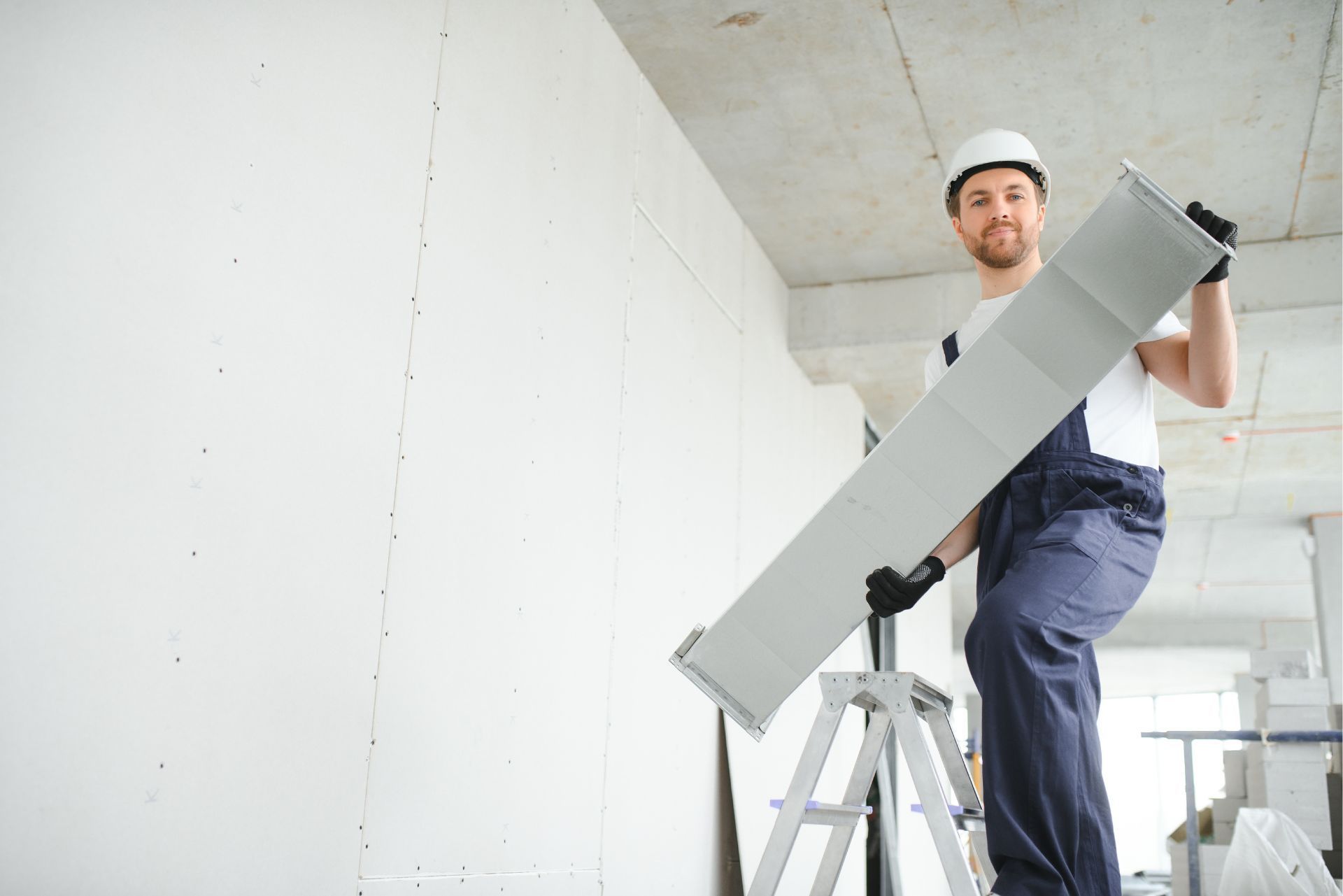Arizona Drywall Contractor Insurance
See How We're Different:
or Call Us:(480) 526-3222

Most Common Business Policies
Index
Contact Us
Operating a drywall contracting business in Arizona comes with its own set of challenges and risks. One of the most crucial aspects of running a successful drywall contracting business is ensuring that adequate insurance coverage is in place. This article delves into the various types of insurance available for drywall contractors in Arizona, the legal requirements, and the benefits of having the right coverage.
Understanding the Basics of Contractor Insurance
Contractor insurance is designed to protect businesses from potential risks and liabilities that can arise during the course of their work. For drywall contractors, this can include property damage, bodily injury, and other unforeseen incidents. Understanding the types of insurance available is essential for making informed decisions about coverage.
Types of Insurance for Drywall Contractors
There are several types of insurance that drywall contractors should consider. Each type serves a specific purpose and can provide essential protection against various risks.
- General Liability Insurance: This is the most common type of insurance for contractors. It protects against claims of bodily injury or property damage that occur as a result of your work.
- Workers' Compensation Insurance: Required by law in Arizona, this insurance covers medical expenses and lost wages for employees who are injured on the job.
- Commercial Auto Insurance: If a contractor uses vehicles for business purposes, this insurance covers damages and liabilities associated with those vehicles.
The Importance of Insurance for Drywall Contractors
Having the right insurance coverage is not just a legal requirement; it also provides peace of mind. In the event of an accident or claim, proper insurance can protect a contractor's financial stability and reputation.
Moreover, clients often require proof of insurance before hiring a contractor. This requirement not only protects the client but also enhances the contractor's credibility and professionalism in the industry.
In addition to the standard types of coverage, drywall contractors may also want to consider specialized insurance options such as equipment insurance, which protects tools and machinery from theft or damage. Given the significant investment in high-quality tools necessary for drywall installation and finishing, this coverage can be crucial. Furthermore, professional liability insurance, also known as errors and omissions insurance, can protect contractors from claims related to negligence or failure to deliver services as promised, which can be particularly relevant in complex projects where client expectations are high.
Understanding the nuances of these insurance policies can be overwhelming, but it is vital for contractors to assess their specific needs based on the scope of their work and the risks they face. Engaging with an insurance broker who specializes in contractor insurance can provide tailored advice and help ensure that all potential liabilities are adequately covered, allowing contractors to focus on their projects without the constant worry of unforeseen financial burdens.

Legal Requirements for Contractors in Arizona
In Arizona, contractors must adhere to specific legal requirements regarding insurance. Understanding these regulations is crucial for compliance and to avoid potential penalties.
Licensing and Insurance Requirements
To operate legally in Arizona, drywall contractors must obtain a contractor's license from the Arizona Registrar of Contractors. This process includes proving financial stability and obtaining the necessary insurance coverage. The licensing process is designed to ensure that contractors meet minimum standards of competency and reliability, which ultimately protects consumers from subpar work and potential fraud.
General liability insurance is not mandated by law for all contractors, but it is highly recommended. However, workers' compensation insurance is required for any contractor with employees. This insurance protects both the contractor and the employees in case of workplace injuries. Furthermore, many clients will specifically request proof of insurance before hiring a contractor, making it not just a legal requirement but a competitive advantage in the marketplace.
Consequences of Not Having Insurance
Operating without the required insurance can lead to severe consequences. Contractors may face fines, legal action, and even the loss of their business license. Additionally, without insurance, contractors are personally liable for any damages or injuries that occur during their work, which can lead to significant financial losses. This liability can also extend to legal fees and settlements, which can be financially devastating for an unprotected contractor.
Moreover, the lack of insurance can severely impact a contractor's reputation. In an industry where trust and reliability are paramount, clients are less likely to hire someone who cannot demonstrate that they are adequately insured. This can create a cycle of financial instability, as the inability to secure contracts leads to reduced income, making it even harder to invest in necessary insurance and compliance measures. Therefore, understanding and adhering to these legal requirements is not just about compliance; it is a fundamental aspect of building a sustainable and reputable contracting business in Arizona.
Choosing the Right Insurance Provider
Selecting the right insurance provider is a critical step for drywall contractors. Not all insurance companies offer the same coverage options, and prices can vary significantly.
Factors to Consider When Choosing an Insurance Provider
When evaluating potential insurance providers, consider the following factors:
- Coverage Options: Ensure the provider offers comprehensive coverage tailored to the needs of drywall contractors.
- Reputation: Research the provider's reputation in the industry. Look for reviews and testimonials from other contractors.
- Customer Service: A responsive and helpful customer service team can make a significant difference when filing claims or seeking assistance.
Getting Quotes and Comparing Policies
It is advisable to obtain quotes from multiple insurance providers to compare coverage options and pricing. When reviewing quotes, pay attention to the details of the policies, including deductibles, limits, and exclusions.
Engaging with an insurance broker who specializes in contractor insurance can also be beneficial. Brokers can provide insights into the best coverage options and help navigate the complexities of insurance policies.
Additionally, consider the financial stability of the insurance provider. A company with a strong financial rating is more likely to fulfill its obligations in the event of a claim. You can check ratings from independent agencies like A.M. Best or Standard & Poor's, which evaluate the financial health of insurance companies. This information can provide peace of mind, knowing that your provider will be able to support you when needed.
Another important aspect to consider is the claims process. Understanding how the provider handles claims can save you time and stress in the future. Look for providers that offer a straightforward claims process, including online submissions and 24/7 support. Some companies even offer mobile apps to track claims status, making it easier to stay informed and manage your insurance needs efficiently.
Common Coverage Options for Drywall Contractors
Understanding the various coverage options available can help drywall contractors tailor their insurance policies to meet their specific needs.
General Liability Insurance
General liability insurance is essential for drywall contractors as it protects against claims of bodily injury or property damage that may occur during the course of work. This coverage can help pay for legal fees, medical expenses, and damages awarded in lawsuits.
For instance, if a client trips over tools left on the job site and sustains an injury, general liability insurance can cover the associated costs, protecting the contractor from financial ruin.
Moreover, general liability insurance can also cover claims related to advertising injuries, such as defamation or copyright infringement, which can be particularly relevant for contractors who market their services online or through various media channels. This additional layer of protection ensures that drywall contractors can operate their businesses confidently, knowing they are safeguarded against unforeseen incidents that could arise from their promotional efforts.
Workers' Compensation Insurance
As mentioned earlier, workers' compensation insurance is mandatory for contractors with employees in Arizona. This insurance covers medical expenses and lost wages for workers injured on the job.
In addition to being a legal requirement, workers' compensation insurance fosters a safer work environment. It encourages contractors to prioritize safety measures, knowing that their employees are protected in case of an accident.
Furthermore, having workers' compensation insurance can enhance a contractor's reputation among potential employees. Workers are more likely to choose a company that demonstrates a commitment to their well-being and safety. This can lead to higher employee morale, lower turnover rates, and ultimately, a more skilled and dedicated workforce, which is invaluable in the competitive construction industry.
Commercial Auto Insurance
For drywall contractors who use vehicles for business purposes, commercial auto insurance is vital. This coverage protects against damages and liabilities resulting from vehicle accidents that occur while conducting business.
Whether transporting materials to a job site or driving to meet clients, having commercial auto insurance ensures that contractors are covered in case of an accident.
Additionally, commercial auto insurance can provide coverage for a range of vehicles, from trucks and vans to specialized equipment vehicles, ensuring that all aspects of a contractor's transportation needs are met. This flexibility allows drywall contractors to choose the best vehicles for their operations without the constant worry of potential financial setbacks from accidents or damages. Moreover, many commercial auto insurance policies also include coverage for theft or vandalism, further protecting the contractor's assets and ensuring business continuity in the face of unexpected challenges.

In addition to the essential insurance types, drywall contractors may want to consider additional coverage options to further protect their business.
Professional Liability Insurance
Professional liability insurance, also known as errors and omissions insurance, protects contractors from claims arising from negligence, errors, or omissions in their work. This is particularly important for contractors who provide design or consulting services along with their drywall installation.
For example, if a contractor's design leads to structural issues, professional liability insurance can help cover legal fees and damages awarded to the client. This type of insurance not only safeguards the contractor's financial interests but also enhances their professional reputation, as clients are more likely to trust a contractor who has comprehensive coverage in place. Furthermore, many clients may require proof of professional liability insurance before awarding contracts, making it a crucial consideration for contractors looking to expand their client base.
Equipment and Tools Insurance
Drywall contractors rely heavily on specialized tools and equipment. Equipment and tools insurance protects against theft, loss, or damage to these essential items. This coverage can help contractors quickly replace tools, minimizing downtime and maintaining productivity. Investing in this insurance can be particularly beneficial in urban areas where theft rates may be higher, or on job sites where equipment can be exposed to harsh weather conditions.
Moreover, many contractors may not realize that the cost of replacing tools can quickly add up, especially if they rely on high-end equipment for precision work. By having equipment and tools insurance, contractors can not only safeguard their investments but also ensure they are always ready to meet project deadlines, which can lead to increased client satisfaction and repeat business.
Umbrella Insurance
Umbrella insurance provides an additional layer of liability coverage beyond the limits of existing policies. This can be particularly beneficial for contractors who face higher risks or work on larger projects. It ensures that contractors have sufficient coverage in case of catastrophic events. For instance, if a serious accident occurs on a job site that results in significant injuries or property damage, umbrella insurance can cover costs that exceed the limits of the primary liability policy.
This type of insurance is especially important in the construction industry, where the potential for accidents is higher. By having umbrella insurance, drywall contractors can operate with greater peace of mind, knowing they have a financial safety net in place. Additionally, it can serve as a valuable marketing tool, as clients often prefer to work with contractors who demonstrate a commitment to comprehensive risk management. This not only protects the contractor but also fosters trust and confidence among clients and stakeholders alike.
Cost of Insurance for Drywall Contractors
The cost of insurance for drywall contractors can vary widely based on several factors, including the size of the business, the number of employees, and the types of coverage selected.
Factors Influencing Insurance Premiums
Several factors can influence the premiums that drywall contractors pay for insurance:
- Business Size: Larger businesses with more employees typically face higher premiums due to increased risk.
- Claims History: Contractors with a history of claims may see higher premiums as they are considered higher risk.
- Coverage Limits: Higher coverage limits generally result in higher premiums. Contractors should balance their coverage needs with their budget.
Average Costs
On average, drywall contractors can expect to pay anywhere from $500 to $2,500 annually for general liability insurance, depending on the factors mentioned above. Workers' compensation insurance costs can range from $1 to $3 per $100 of payroll, depending on the risk classification of the work performed.
It is essential for contractors to budget for insurance costs as part of their overall business expenses. Investing in the right coverage can save money in the long run by preventing financial losses from unexpected incidents.
Tips for Reducing Insurance Costs
While insurance is a necessary expense, there are strategies that drywall contractors can employ to reduce their insurance costs without sacrificing coverage.
Implementing Safety Measures
One of the most effective ways to lower insurance premiums is to implement safety measures on job sites. By prioritizing safety, contractors can reduce the likelihood of accidents and claims, which can lead to lower premiums over time.
Regular training for employees on safety protocols, maintaining equipment, and conducting safety audits can all contribute to a safer work environment.
Bundling Policies
Many insurance providers offer discounts for bundling multiple policies together. Drywall contractors can save money by purchasing general liability, workers' compensation, and commercial auto insurance from the same provider.
Reviewing Policies Regularly
Regularly reviewing insurance policies can help contractors identify areas where they may be over-insured or under-insured. As the business grows and changes, adjusting coverage to reflect current needs can lead to cost savings.
Conclusion
In conclusion, drywall contractor insurance is a critical aspect of running a successful business in Arizona. Understanding the various types of coverage available, the legal requirements, and the associated costs can help contractors make informed decisions that protect their business and employees.
By investing in the right insurance, drywall contractors can mitigate risks, enhance their credibility, and ensure long-term success in a competitive industry. Whether it's general liability, workers' compensation, or additional coverage options, having adequate insurance is not just a legal obligation but a smart business strategy.
For drywall contractors in Arizona, taking the time to research and choose the right insurance provider can make all the difference in safeguarding their business against unforeseen challenges.
